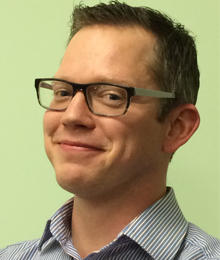An interview with Bjorn Nielsen
February 2020
Bjorn Nielsen is Principal Scientist at ALS Environmental UK and a member of the Microbiology Society. In this interview he tells us more about the work he and his company does in the field of water and environmental analysis, and his involvement in standardisation committees.

Tell us about your current role
I am Principal Scientist for microbiology, for the UK Environmental arm of a large, multinational laboratory testing company. We test different types of water and associated samples including drinking water, ultra-pure water, industrial process water and waste water for a range of microbiological and chemical parameters. The testing is often carried out to meet legislative requirements or industry guidance. My role is varied, and covers method development and validation in addition to technical management support for three UK laboratory sites.
What is your biggest achievement(s)?
It’s hard to pick a single one:
- Taking on the convenorship of an International Organization for Standardization (ISO) working group and leading the development of an ISO standard through collaborative effort; achieving approval by all standards bodies involved and publication of the standard
- Seeing colleagues develop their skills by involving them in validation and development work and other projects beyond their routine work
- Validating and achieving accreditation for the use of Matrix-Assisted Laser Desorption/Ionization-Time of Flight (MALDI-TOF) mass spectrometry (MS) as a bacterial identification and confirmation technique, which was a novel technique for our industry at the time.
You are the Chair of the British Standards EH/3/4 - Microbiological Methods committee and also represent the Microbiology Society. Tell us a little more about the work of this committee and why it is important to get involved with activities like this?
The committee is charged with drafting British Standards for the microbiological aspects of water quality. This includes analytical method standards, through to best practice standards for assessing and managing microbiological risks in water systems. It identifies standardisation gaps and links proposed standardization work to the UN Sustainable Development Goals where applicable. The committee also represents UK interests within European (CEN) and ISO Water Quality technical committees. I and other members of the committee have also chaired ISO working groups, leading the development of specific standards.
It is important to have a wide variety of relevant experience, actively engaged with the work of standardisation committees. This leads to the development of better and more appropriate standards which can be applied effectively. Standards are often referenced subsequently in legislation and guidance and become the de facto approach to be followed; therefore robust, usable standards are essential. Input from all stakeholders, from research to policy and end users plus others is therefore required to ensure this.
Why did you join the Microbiology Society?
After many years working in specific industries, focussing on certain areas of microbiology I was interested in getting a broader view of the topic of microbiology; learning where microbiology is now, how it has developed since I studied it academically and what newer developments could be applied to my field.
What advice would you give to anyone thinking about joining the Microbiology Society?
Do it! Make use of the resources it offers. Publications such as Microbiology Today and journal articles are great resources.
What advice would you give to early career microbiologists who have an interest in a nonacademic career?
There are a wide variety of microbiology roles in industry. Sometimes these roles are not immediately apparent or high profile, so professional networking, using the resources of professional bodies, such as the Microbiology Society and the industry knowledge of people – such as specialist recruiters – is important to understand the landscape and find routes in.
Give us your perspectives on the field of microbiology outside of academia?
My experience has been in fields where the testing has been dominated by regulatory requirements, legislation or health and safety guidance. Although the testing requirements may often be set, the testing is always evolving and improving. New areas, techniques and applications often become standardised. Although my experience has been in commercial environments, I have found that there is good collaboration with in the industries I have worked in, which pushes things forward.
Why does microbiology matter?
It’s so important in so many fields. The public health aspects of microbiology extend beyond healthcare into industries involved in identification and prevention of risk. Microbiological safety is a constantly evolving area, even just within my field of water quality. As new potential risks are identified, the associated methods to detect these plus the control measures, industry guidance, standards and legislation are developed or adapted to meet the challenge. The development and application of more rapid and accurate methods, which can be carried out consistently, is important in improving public health.
What inspired you to pursue a career in the field of microbiology?
I studied for a degree in Biology and was heading towards specialising in ecology, but I just got hooked onto microbiology and moved towards specialising in that field. This genuine interest led to me to look for jobs in microbiology following graduation.


